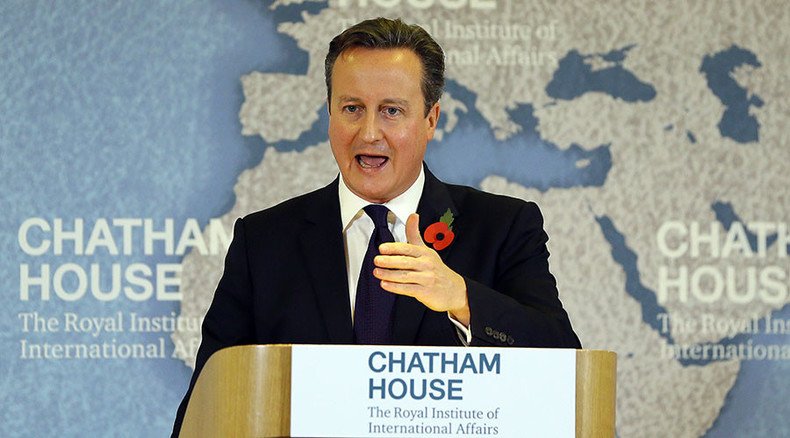‘Brexit could pose national security risks’ – Cameron

Leaving the European Union may have implications for national security, Prime Minister David Cameron said in a speech outlining his EU renegotiation plan, as his pro-EU reform campaign shifts gears.
Noting the world has become an “undoubtedly more dangerous place in the last three years,” Cameron said leaving the 28-member bloc could pose security problems.
“Our membership of the EU does matter for our national security and for the security of our allies, which is one reason why our friends in the world strongly urge us to remain in the EU,” he said.
Today I set out the four objectives at the heart of our EU renegotiation. We need action in all four areas.Objective...
Posted by David Cameron on Tuesday, November 10, 2015
“The EU, like NATO and our membership of the UN Security Council, is a tool that a British prime minister uses to get things done in the world, and protect our country.”
Cameron has said he hopes to secure a “legally binding and irreversible agreement” with EU leaders and cautioned a Brexit is not a “fast track to the land of milk and honey.”
Speaking at a keynote address at Chatham House, the prime minister noted that “emotional ties” alone should not keep the UK in the economic union. He indicated that remaining in the union would serve British interests by helping keep Britain at the top table of global affairs.
“The question is not whether Britain could survive outside the EU – that’s not in question. The question is whether we are better off in or out,” he said.
“We have every right to do that as a sovereign nation. But we should do so with our eyes open.”
Cameron used the speech to outline a four-point reform plan addressing Britain’s relationship with the EU ahead of a referendum promised by the end of 2017, but expected as early as June 2016.
“I have every confidence that we will achieve an agreement that works for Britain and works for our European partners,” he said. “If and when we do so ... I will campaign to keep Britain inside a reformed European Union.”
Acknowledgement of receipt. With @David_Cameron's letter, negotiations on #UKinEU can now begin
— Donald Tusk (@eucopresident) November 10, 2015The nation holds its breath. It's here! Cameron's letter to Tusk has landed! pic.twitter.com/PsqXDkuzXg
— Matt Chorley (@MattChorley) November 10, 2015His four-point plan includes an exemption from the European principle of an ever-closer union, increased protection for member states outside the Eurozone, heightened immigration restrictions, as well as reforms to improve competitiveness and reduce red tape in business.
Cameron said he wants to establish a “British model of membership” for countries in Europe which do not use the euro currency, where they are “rule makers instead of rule takers.”
The prime minister also said he would restrict benefits access for EU immigrants.
He said if the reforms are not met, leaving the bloc would not be out of the question.
“But if we can’t reach such an agreement and if Britain’s concerns were to be met with a deaf ear, which I do not believe will happen, then we will have to think again about whether this European Union is right for us.”
Addressing critics who accuse him of asking for too little, Cameron said his reforms are what Britain needs and insisted he would not budge on these four points. He said how the plan would be implemented remains to be discussed with European leaders.
Cameron insisted a referendum would be a “once in a lifetime” decision and not the beginning of a negotiation process, ruling out a second plebiscite.
The speech came hours before a formal letter to European Council President Donald Tusk outlining the reform demands is to be published by Parliament.
Mr. Cameron's speech was an attempt to portray a new 'third way' relationship with Brussels that is simply not on offer.
— Nigel Farage (@Nigel_Farage) November 10, 2015Conservative Euroskeptics attacked Cameron’s reform plans as “symbolic” gestures lacking any teeth. Tory MP Peter Lilley said merely changing the wording of “ever closer union” will not make much difference
Reaction from Europe has been mixed.
Cameron signalled he may be “open to different ways of dealing with the issue” after European Parliament President Martin Schulz warned the proposed four-year benefit ban may be illegal.
“It is good that the UK’s requests are now set out officially,” Schulz said after Cameron’s speech.
“I have strong doubts about the legality of the four-year ban on access to welfare benefits for EU citizens, but [will] wait to see what specific ideas the British government will come up with in the end in this particular area.”
German Chancellor Angela Merkel said she wants to “take a solution-based approach” to Cameron’s demands.
“There are some that are difficult, and some that are less difficult. But if you have a willingness to solve this then I am confident we can resolve it.”
LISTEN MORE:












